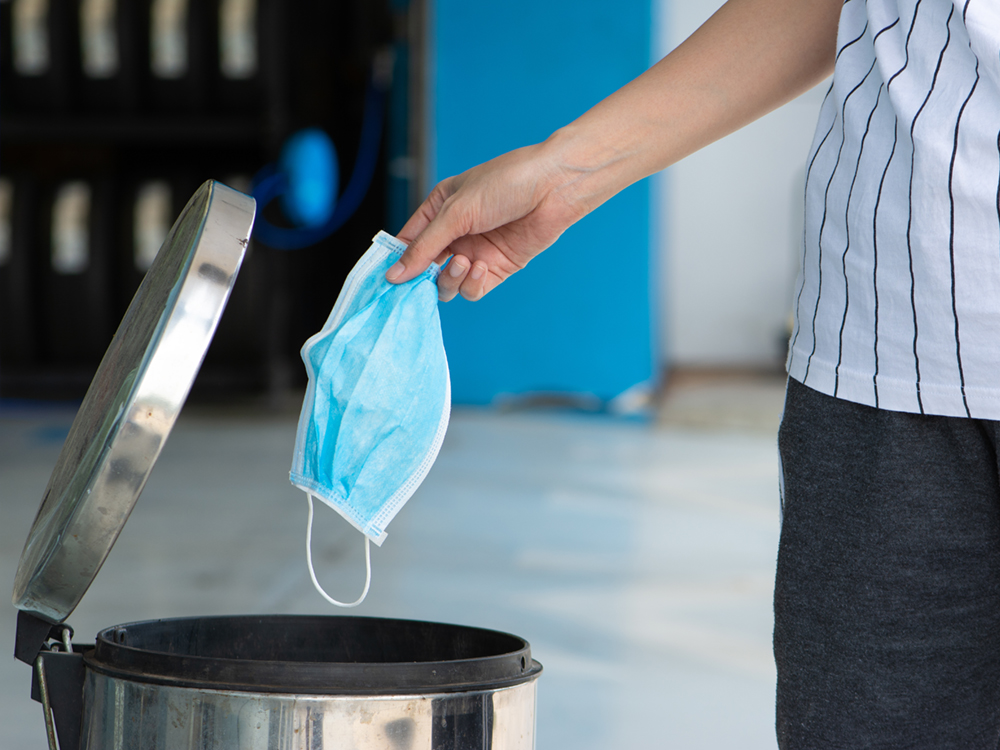Almost $30 million worth of personal protective equipment the B.C. government bought to deal with COVID-19 was disposed of without being used because it was expired or too low quality.
That was about half of the PPE purchased by a new government unit in the first response to the pandemic, according to a report from the internal audit and advisory services division in the Finance Ministry’s office of the comptroller general.
The report also made recommendations aimed at avoiding similar problems in future emergencies, but it’s unclear whether the government has acted on them.
“The Government was not prepared for a global supply chain disruption of this scale,” the auditors reported. “Although the Government has a system of plans in place to respond to various emergencies, there is a gap in the planning, knowledge and resources relating to the management of a global supply chain disruption.”
Early in the pandemic that lack of preparation meant the government had to scramble to find and buy PPE at a time when many national borders were closed and many other buyers were competing for scarce resources.
To handle the task it created a new provincial supply chain coordination unit with leadership from Emergency Management BC and three ministries: Citizens’ Services; Jobs, Economic Recovery and Innovation; and Transportation and Infrastructure. The unit also had support from the Provincial Health Services Authority. (Jobs, Economic Recovery and Innovation has since been renamed Jobs, Economic Development and Innovation.)
By October 2021, some 18 months after the pandemic’s arrival in B.C., the new supply chain unit had found and bought $61 million worth of PPE. About $16 million worth was transferred to the Provincial Health Services Authority and $6 million of it was sold to other parts of the public sector. The unit also negotiated to reduce some PPE orders, saving about $10 million the government had been under contract to spend.
A significant part of the spending was, however, wasted. It included an estimated $16 million worth of PPE that was “disposed of due to quality issues” and a further $13 million worth that “expired throughout the year,” the report said.
“Buying in uncertain market conditions led to purchasing low-quality PPE,” the report found.
Other jurisdictions experienced similar problems. In 2022, Ontario’s Auditor General found Canada’s biggest province had disposed of $66 million worth of PPE that was either damaged, obsolete or expired.
The B.C. audit did not cover PPE purchases made by the health sector. It’s previously been reported that about 20 per cent of the PPE that the provincial health authority and Vancouver Coastal Health bought was deemed unfit for use, leading the health authority to write off $67.4 million in 2021 and Vancouver Coastal Health to write off $37.4 million.
Responding to The Tyee’s questions, a statement from the Ministry of Health said that PPE that fails to meet the “strict, well-established clinical standards” for use in health-care settings may still be usable in other settings.
“We have worked with our partners and groups outside health care, such as non-profits or non-health organizations, to find ways to repurpose or donate some of this PPE, where it makes sense and is safe to do so.”
The audit report, "Procurement of Personal Protective Equipment During the COVID-19 Pandemic: Phase 1," is dated March 2022 and appears to have been posted to the government’s website earlier this year.
The auditors recommended doing more to prepare ahead of future emergencies. “Developing a provincial supply chain management strategy would help to address these issues and identify and prepare for future supply chain security risks.”
Aside from better planning that takes into consideration future emergencies, the auditors also recommended developing a “stockpile strategy” to determine how much PPE the government should have on hand and to assess how that inventory is managed.
The supply chain management strategy needs to recognize the province’s dependence on foreign suppliers, the report said. “The global supply chain disruptions during the pandemic highlighted supply chain security risks,” it said. “Global supply chain disruptions can occur for a variety of reasons, including labour shortages, extreme weather events or political conflict.”
The auditors included clear instructions for next steps.
“We require the Government to develop and submit an action plan in response to the recommendations provided in this report, including their timeframe for implementation,” they said. “We will then conduct an annual followup to assess progress in implementing the action plans.”
A response from the Ministry of Emergency Management and Climate Readiness to questions from The Tyee said there were learning opportunities during the COVID-19 pandemic and that through the experience the ministry developed new relationships inside and outside of the government “to ensure we had access to supplies like PPE.”
An exercise in February involving several levels of government and various agencies around how to respond to a major earthquake included work on “developing planning approaches to facilitate last-mile distribution of essential supplies following a catastrophic event,” they said.
The spokesperson did not respond by publication time to a direct followup question about whether the action plan the auditors required had been completed.
Nor did they mention an action plan in response to earlier questions about what lessons the government had learned, what changes it had made, and what steps it may have taken towards developing a supply chain management strategy. ![]()
Read more: Health, Coronavirus

















Tyee Commenting Guidelines
Comments that violate guidelines risk being deleted, and violations may result in a temporary or permanent user ban. Maintain the spirit of good conversation to stay in the discussion and be patient with moderators. Comments are reviewed regularly but not in real time.
Do:
Do not: